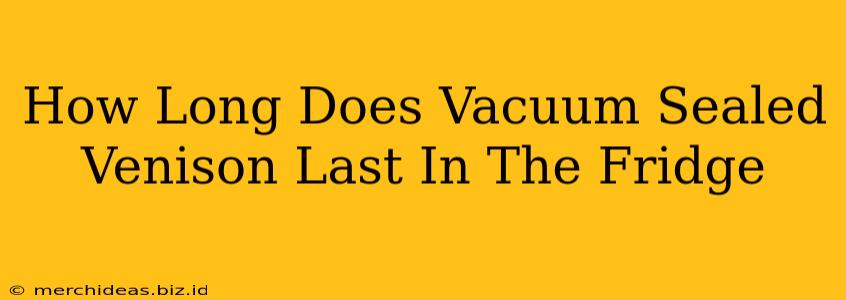Properly storing venison is crucial for maintaining its quality and safety. Vacuum sealing is a popular method for extending the shelf life of venison, but how long does it actually last in the refrigerator? Let's dive into the details.
Understanding Vacuum Sealing and Venison Storage
Vacuum sealing removes air from the packaging, significantly inhibiting the growth of bacteria and slowing down spoilage. This method, combined with refrigeration, can significantly extend the time you can safely store your venison. However, it's not a magical preservation technique; it still needs to be handled correctly.
Factors Affecting Shelf Life
Several factors influence how long vacuum-sealed venison remains safe to eat in the refrigerator:
- Initial Quality of the Meat: Venison that was properly processed and cooled quickly will last longer than meat that wasn't.
- Thickness of the Cuts: Thicker cuts will take longer to cool and may spoil slightly faster than thinner cuts.
- Refrigerator Temperature: Maintaining a consistently cold temperature (below 40°F or 4°C) is critical. A malfunctioning refrigerator can dramatically shorten the shelf life.
- Packaging Integrity: Any punctures or leaks in the vacuum seal will compromise the protection and reduce the storage time.
How Long Can You Keep Vacuum Sealed Venison in the Fridge?
While some sources suggest a longer timeframe, a conservative estimate for vacuum-sealed venison in the refrigerator is 3-5 days. After this period, the risk of bacterial growth increases significantly, even with vacuum sealing. It's always better to err on the side of caution.
Visual and Smell Checks are Important
Before consuming any venison, regardless of how it's packaged or stored, always perform a thorough inspection. Look for:
- Changes in color: Discoloration or unusual darkening is a warning sign.
- Slimy texture: A slimy or sticky surface is a clear indicator of spoilage.
- Unusual odor: An unpleasant or sour smell is a definite sign that the venison has gone bad.
If you notice any of these signs, discard the venison immediately. Do not risk consuming spoiled meat, as it can cause severe foodborne illness.
Freezing for Longer Storage
For longer-term storage, freezing vacuum-sealed venison is the best option. Frozen venison, properly packaged and stored at 0°F (-18°C) or lower, can last for several months, even up to a year, maintaining its quality and safety. Always label and date your packages to ensure you use the oldest meat first.
Conclusion: Prioritize Safety
While vacuum sealing extends the shelf life of venison in the refrigerator, it's vital to remember that it's not a substitute for proper refrigeration and careful handling. Always prioritize food safety. If you have any doubts about the freshness of your venison, discard it rather than risk food poisoning. Remember the 3-5 day guideline and always check for signs of spoilage before consumption. Freezing remains the best option for long-term preservation.
